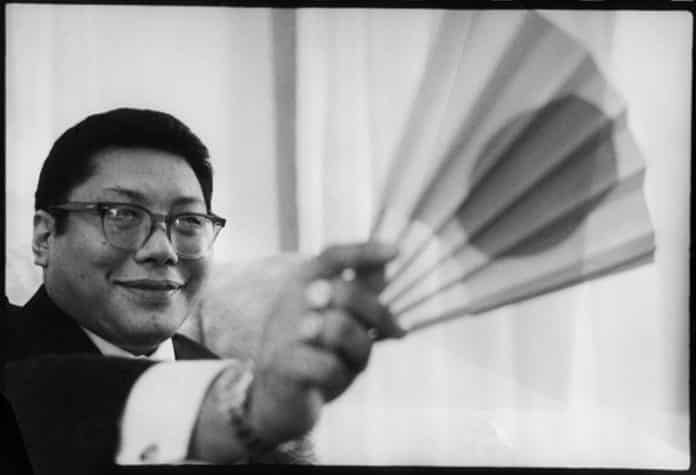
Rinpoche gave this talk to the Boulder sangha on January 24, 1977, just days before leaving for a year-long retreat.
A lot had happened in the six years and four months leading up to this moment. Since arriving at Tale of the Tiger in the late summer of 1970, Rinpoche had given over twelve hundred talks, led four seminaries, founded Vajradhatu, Naropa, and Shambhala Training; received the first Shambhala treasure teachings, bestowed Vajrayogini abhisheka, and set key activities of the mandala in motion, including translation, dharma art, kasungship, service, hosting visiting teachers, and so on.
For the sangha, this would be Rinpoche’s first absence. Up to this point, he had been an almost constant presence in their lives.
It is personally very important to me to let everybody know what mistakes we have made in the past, and what achievements we have accomplished. On the whole, needless to say, what we have done has been worthwhile. Vajradhatu has become an absolutely worthy cause, and we ourselves have become worthy as individuals. In the early days when we were just establishing the buddhist vision in the Western world, we began at the beginning and tried to go very slowly, extremely slowly. We started on the basic concepts of vajrayana disguised as hinayana, and worked with the simplicity of sitting practice, the painfulness of it, and all the rest. That has become the fundamental basis of our community’s sanity, so that nowadays the visiting teachers and visiting critics, including His Holiness Karmapa, have begun to feel that something is actually cooking here, something is actually happening.
I have been working with you people all this time and have a relationship with each one of you. Sometimes I feel unhappy because you indulge your own personal trips so much. But in spite of that little pain, that little bit of dissatisfaction with you as students, I regard those problems as part of our growing pains, part of our labor pains, and I have never given up on anyone of you at all.
I have taken each one of you to my heart as a good friend, good student, and good buddhist. You have practiced meditation, you have taken refuge vows and bodhisattva vows, and everything we have done together has proved to be magnificent. At this point His Holiness and the other visiting teachers have begun to trust us—both the teacher and the students—so much that, we could almost begin to feel somewhat nervous. They have begun to feel that these students and this teacher can’t do anything wrong at all. They have given their complete, full trust and compliments to everyone of us, from the ones with the littlest duty up to the ones with the biggest duty. Actually, they have more than acknowledged us: they have included us as part of their vision of the expansion of dharma, as part of the Lord Buddha’s inspiration. It is a very moving experience for all of us.
A lot of you probably still have some sense of discomfort. I don’t particularly mean that you are apprehensive of becoming crazy, but you still have some little personal problems that you wish you could push away. You would like to push your little pain off somewhere, and achieve an ideal state of being. But, as we know, that is impossible. We still have to work much harder—very hard, extremely hard. We have just now established what we could call buddhist sanity, which exists and is practiced by the American students. We have just begun that, and that beginning is extraordinarily dramatic and powerful. To some people it is very frightening; to others, it is highly inspiring. And we have done it, we have manifested it—so that at this point everyone of you sitting here has no hesitation or difficulty in sitting on your zafu—I hope.
This is a genuine world that the Americans—or the Westerners, shall we say, the occidental people—have never witnessed. We have proved that it is possible to have a close to ideal society where everything—sanity and neurosis—can be included in one big mind, where people can actually practice, work, study, and be disciplined. We have actually become clean, good, impressive, and elegant, in all senses of the word—both physically and psychologically. And from that point of view, my appreciation of you people is enormous, extraordinary.
You have made me younger. You have extended my life dozens of years at least. It is your doing. In fact, you have affected His Holiness, himself—now he can relax; he no longer has to hold himself so tightly. There were a lot of differences between His Holiness’ first visit and his recent one, which is a remarkable sign. It shows that he has begun to realize that the smoothness and dignity of his Tibetan world have finally clicked completely, without even second thoughts, in the world of the American students of buddhism. He is very happy and has great confidence in all of us, that is to say, both in you as students as well as in me as the teacher.
We have achieved what we wanted to achieve. In fact, we are slightly ahead of our plan. If you talk to one of our students and watch his or her neurosis, at that point you have the feeling that this project is going to take a hundred years. [Laughter.] But all the same, it has been taking only a very short time. You have demonstrated your devotion, your sense of elegance, and your inspiration magnificently, and we have a very good relationship with each other, an extremely good one. But our relationship should be adorned with formality at the same time. By formality I am not talking about stuffy red tape anymore; I am referring to a naturally arising situation. When something is precious, it should be cherished, rather than handed around casually. You, as students, are as precious to me as I, the teacher, am to you. So we should maintain that kind of crystal clear preciousness of each other, we should maintain our formality. So far, it’s an ideal world (laughs). But you might say there is something tricky about that. A lot of you people have to sit more and psychologize less—don’t you think so? [Laughter.]
We have almost achieved what’s known as the vajra world. We have achieved at least 60 percent of it, and now we should actually go beyond that. We should achieve 200 percent of it! Even 100 percent is not good enough; it’s just not good enough. It seems that our community members, everyone of them, are getting younger, more cheerful, and very mystically, becoming tough at the same time. That is a very good sign. But we still have to work harder. That doesn’t necessarily mean that we are still infants; I think we have reached the teenage level. But still we have to reach the late teenage level. This point is quite dangerous in some sense. We are already energized, full of inspiration and wakefulness of some kind, but we still have to learn how to be more solid and more inspired. We still have to look further, much further.
As we know already, there are three things that we can do, or that are demanded of us in some sense, since we have no choice. The first thing we must do is make our practice of sitting meditation very definite and very real—more real. Please don’t regard yourself as bad boys or as bad girls for having not sat in these past few weeks while His Holiness was here—but basically we have to build up our general sense of practice, our actual sitting practice itself. That is very important. Without that, we lose contact; our communication breaks down. We begin to find that although we are already on the way somewhere, we do not know where we are going. So sitting practice of meditation is very important. Within this community setup, we have established a lot of strategies to make ourselves sit more. There are all sorts of forms: we have weekthuns, dathuns, and regular nyinthun practices of all kinds. These are very important and I would like to stress them a great deal. They are very important.
The second thing we must do is pay attention to our livelihood. I’m sure a lot of you who are members have heard this before, but I would like to reiterate. Livelihood involves the question of economy and the maintenance of this facility. It means maintaining our lives so that we have some economic relationship with our hamburger, our cup of coffee—and with the paying of our dues. It involves the community’s attitude toward our mutual project, which has been working very successfully. Our livelihood, or life situation, is not so much of a dream or a dance anymore; our life is serious work. At the same time, of course, that very serious work is based on some kind of cheerfulness and sense of humor. So we must sit and practice, and relate with our life.
The third situation that community people should work on is study, which is very important. If you don’t study enough—and practice enough at the same time—you will just be slowly rotting in the Vajradhatu world. If you don’t understand what the teaching is all about, if you don’t understand the basic logic of the teaching, you’ll slowly rot. Not only that, but you acutally have a further duty to transmit what you have understood to others. That is our next plan—to send all of you out to teach, every one of you. You have to teach people to sit, teach people not to think so much, teach people to think a lot, and all the rest of it. If you do not have any understanding of the teachings, you will have no teaching capabilities at all; you will just become dumbfounded. In any case, when you begin to teach, at the same time that you begin to realize how much you do know, you also realize how much you don’t know. So before you teach, you have to study. You have to learn all about the dharma: it’s very sophisticated and powerful metaphysics; the philosophies that are connected with studying the human mind, our own mind; the study of reality; the function of the dharma and everything else.
It is very important for you to study if you want to survive. If you don’t study, you are going to perish as if you didn’t have any oxygen left. If you don’t study, you can’t teach; and if you don’t teach, you will die in depression. It is very important for you to realize the importance of this. If you don’t understand the dharma because of your lack of personal interest in learning all its details and subtleties, then you are committing yourselves into a meditative nuthouse. You can sit a lot, but so what? If you don’t study, you don’t have compassion, you don’t have sympathy to others in the world. You become so mean, just sitting by yourself and practicing, that there is no outlet, no way to do anything at all.
So those three principles—practice, money and learning—actually work with each other and all three of them are very important. People in the past have worked on those same three things.
Overall, it seems that there is a need for a refined sense of humor that will cut your karmic neurosis so that you no longer lay heavy trips on yourselves. Instead you begin to feel that there is an actual celebration taking place. A genuine sense of celebration takes place, and it becomes very real. So dharma practice, dharma presentation, and the student-teacher relationship all become very real and very genuine.
If you have any questions, we could have a discussion.
QUESTION: At the audience that I had with Karmapa, he stressed that when you take refuge in the sangha that refers to the monkhood, to the priests. And when we told him that we thought we were the sangha, he said we should ask you what our relationship was.
RINPOCHE: Well, if you get a chance to talk to His Holiness again, tell him that although we are not a monastic order, we are also members of the sangha; we are the vajra sangha. Okay? [Laughter.]
Q: Could you please say something about how the Karma Dzong community should relate to the general Boulder community?
R: Well, I think we are already doing it, except that more people from Boulder should be converted by the Karma Dzong people. That’s it. Very simple. The Karma Dzong community shouldn’t remain an enigma. We should present ourselves as genuine people, good nontheistic people who are willing to work with anybody, anytime, willing to teach them the practice of meditation. That’s it!
Q: Rinpoche, you have said on different occasions that you’re glad that we’re not rich, and you’re thankful that we’re poor. Yet the vajra world requires elegance and money.
R: That’s right.
Q: Now I’m sure there’s no discrepancy [laughter], but could you explain it?
R: Well, that’s a very good one actually. We don’t have lots of money. None of us has any money at all, did you know that? [Laughter.] Our wallets are usually empty. But we are able to present ourselves in a very dignified and opulent way. By opulence I don’t mean richness created by money alone; I mean a state of mind which reflects a sense of delight and satisfaction in life, one which presents a sense of elegance generally. The term for the kind of opulence that comes from wealth alone is nouveau riche. Nouveau riche refers to people who have lots of money but do not know at all what they should do with it. They spend millions and trillions of dollars on one gold toothpick, and still they look very cheap, absolutely cheap. They are very crude and crummy, and they do not even have good table manners. They don’t know how to choose their suits and ties. They might choose only the most expensive clothing, but their wealth combined with their lack of taste produces terrible results.
In our case, however, that nouveau riche tendency is watered down becuase we just don’t have enough opulence as far as money goes—and at the same time, we do have a sense of elegance already. So we do the best we can, with whatever cash we have, all the time. That is actually the art of being elegant. It depends not so much on whether you are rich all the time, but on whether you know how to manipulate, how to spend your money. The whole thing could become very beautiful, a work of art in itself. If you are too rich, you do not have to use your brain anymore. You just buy, or even get somebody else to buy for you. You can call an interior decorator to arrange your home; you can send someone out to buy your shoes—and in fact they won’t fit you. That kind of situation is very sad. A lot of money is wasted completely, absolutely wasted. But we who are poor and elegant will pick and choose, one article at a time—one tie from among the others, one suit from among the others. We know what we want and we can actually recognize it.
Money doesn’t make people elegant; elegance is something separate. When people are intelligent, and particularly when they are inspired by the Great Eastern Sun and the vajra world, their taste cannot go wrong. With our money we can buy little by little, rather than in big chunks. That is our saving grace. Our community is growing by being squeezed; and one by one, little by little, every member of our community is becoming very elegant. This is so because we do not have too much money to throw around, to play around with. That seems to be the point, actually. If we had too much money, we couldn’t develop the vajra world; there would be no need for it. So although our funds are tight, our vision is enormous. That is the way we behave; and that combination works very brilliantly and very beautifully [laughs.]
Well, ladies and gentlemen, I think we should stop at this point. I would like to say farewell, good-bye to everybody. This is my famous last speech; I won’t be speaking to you again in this fashion before I leave. We are planning to have the birthday celebration, but I don’t particularly want to talk about philosophy or wisdom there. In any case, you have become wonderful students, and I have no regrets at all. You have every piece of me; you can have me [laughs.] Thank you for being such wonderful students. I will miss you in my retreat and be thinking of you all. And I’ll come back. Thank you.
Reprinted from Selected Community Talks © Diana J Mukpo. Used by permission of Diana Mukpo and Shambhala Media. Originally posted on 22 February 2010.







